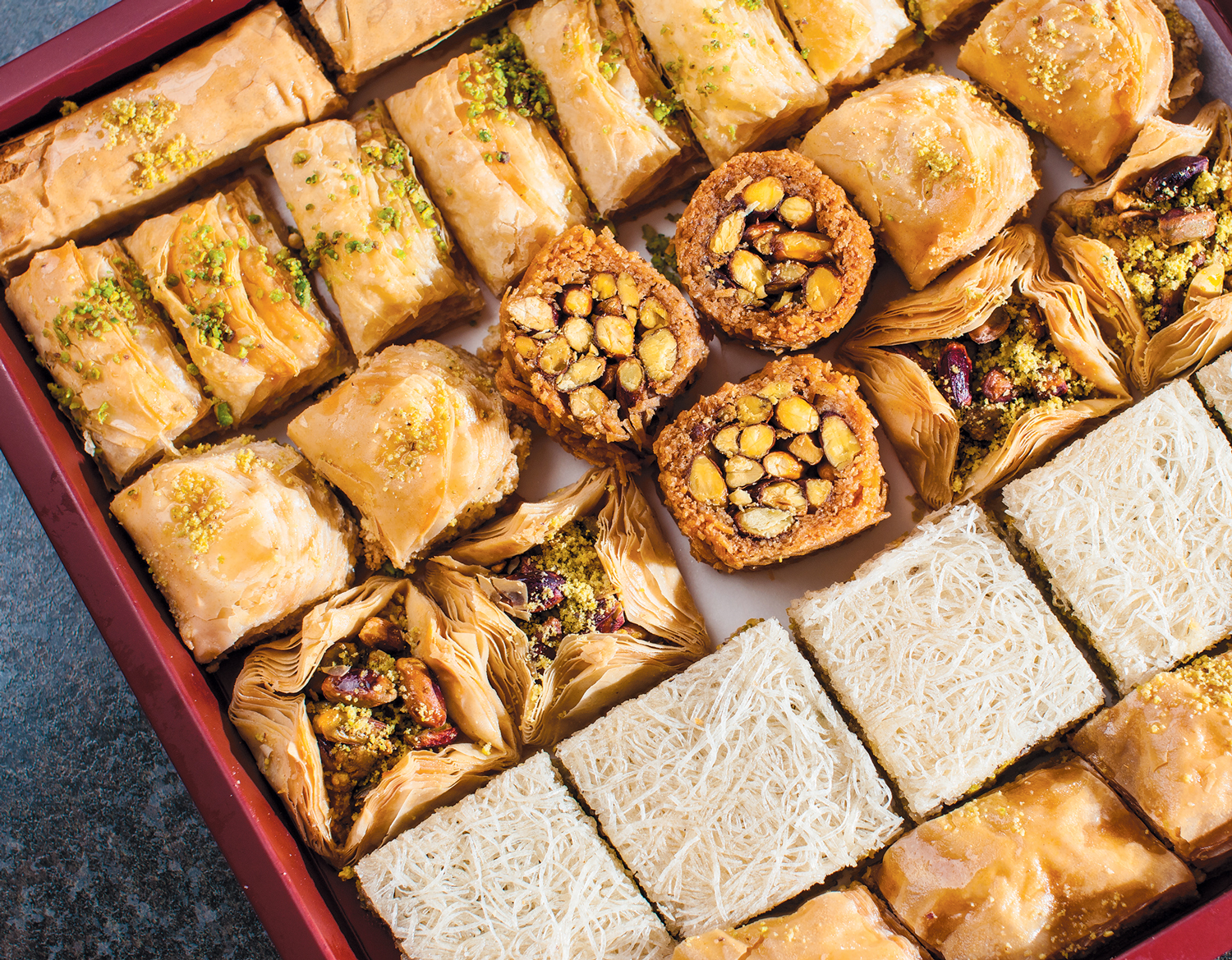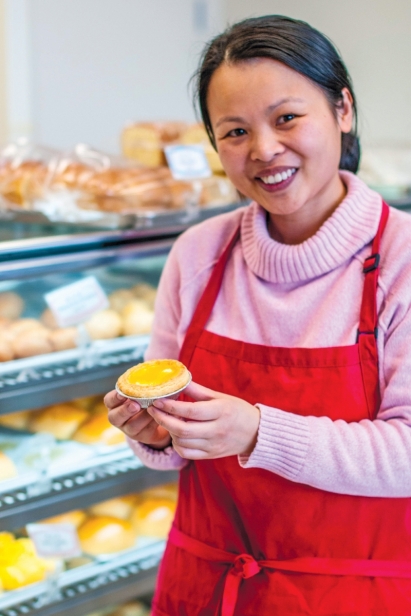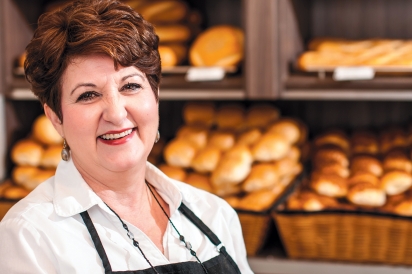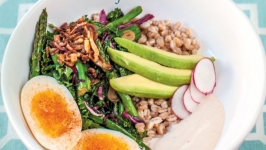Exploring Milwaukee's Bakeries
Taste the Flavors of America, Old and New
The reverberating thunk of the 1902 Milwaukee Business Directory as it hits the table at the Milwaukee Historical Society elicits stares from other patrons. Archivist Steve Schaffer laughs and says, “It’s the sound of research!” I’m on the hunt for bakeries. When the guide was published, the population of Milwaukee was 285,000 people and rapidly growing. And bakeries? About one per thousand residents.
Joseph Poehlmann was operating on Ogden Avenue. Mary Riordan (widow) ran her home bakery at 629 Grand Avenue (Wisconsin Avenue) while Dora Salzmann did the same on 17th and Wright Street. Stanislaus Wachowiak took care of Grove Street (now 5th Street), and Max Wloszczynski serviced 1st Street. The surnames of these bakers tell the story of Milwaukee’s immigrant history.
Poehlmann’s is the first recorded bakery in Milwaukee history. In 1853 Bavarian immigrant Fritz Poehlmann began building his ovens on East Ogden Avenue in the Yankee Hill neighborhood to serve the needs of newly arrived Bavarian craftsman. Rye bread as enjoyed by the southern Germans was unknown to the first wave of Milwaukee settlers. Poehlmann worked with a mill in Cedarburg to grind rye flour that he could use to make his signature bread. It was wildly popular with both the Bavarian-born new Milwaukeean and his “Yankee” neighbors. The first “ethnic” bakery was a success.
Dave Schmidt, president of the Wisconsin Baker’s Association, says that most family-run bakeries have a lifespan of about three generations. Instead of seeing this as negative, he sees the opportunity for new businesses. “Baking is a growing field. People today are looking for high-quality goods that they can’t make at home.” According to Schmidt, the last ten years has seen the growth in new bakeries coming primarily immigrant communities. “The Hispanic baking community is introducing new products that are now adopted by the general bakery industry.
Entrepreneurship is Universal
The motivation for starting a bakery comes from a confluence of animating spirits. Love and knowledge of the foods. A desire to fill a need in your community. And of course, an entrepreneurial drive. Xin Feng Chen and her husband, Bing Pei Huang, spent two years planning before the opening Lucky Bakery & BBQ in West Allis in 2014. Huang apprenticed at bakeries in Hong Kong and Chicago before making his move north.
I ask Chen if she’s had to change their recipes to accommodate American tastes. She smiled and said, “No. We use the traditional methods and traditional flavors. Hong Kong-style bakery uses much less sugar than other styles. People are learning to like less sugar.” Hong Kong and other Asian baking require complicated steps in mixing, resting and assembly. One happy customer told me as she took her heavily laden bags, “This is too difficult to make at home. And Lucky Bakery makes it better than I could!”
A favorite item at Lucky Bakery are the stuffed buns. In addition to baked goods, Huang is a master of Chinese barbecue styles. The stuffed buns are a blend of both light, and airy, buns stuffed with minced barbecue pork and other specialties. As we’re all Americans, Chen offers the kid favorite—the “hot-dog-stuffed bun.” Another customer extolled the stuffed buns, saying, “I discovered real Chinese food when traveling, and I love it. The stuffed buns are great for an easy lunch.”
From One Melting Pot to Another
Also arriving to Milwaukee’s South side, Dirar Abu Qwider knew that he had found the perfect location for his Jerusalem grill. “People mix together here. They all love food!,” he says. Rarely does an entire restaurant emigrate—but that’s exactly what Abu Qwider did when he opened Jerusalem Grill and Pastries on South 76th Street. “I started in Jerusalem in 1996 and came here in January of 2016.” He’s thrilled to bring traditional Eastern Mediterranean street food and pastries to the area. “Where I’m from, it’s a thousand-year mix of people: Syrian, Palestinian, Lebanese … so our food reflects all those influences.”
What sets Jerusalem Grill and Pastry apart from other Middle Eastern restaurants is its full bakery. Arab pastries require not only precise skills, but the right atmospheric conditions. High humidity can easily sabotage a batch of delicate cookies. Bourma—a baked confection comprised of butter-fried threads of dough, stuffed with pistachios, then lashed for three days with honeyed water, then finally pressed into shape—takes three whole days to complete.
Jerusalem Grill and Pastry does catering for weddings and celebrations, in addition to their daily restaurant service. Abu Qwider proudly displays the pastry cases decorated with ornate gold designs imported from Syria. Abu Qwider are encouraged by the hearty welcome they’ve received and encourage their new neighbors to enjoy the flavors of the Levant.
Rosalba Canfora was a young bride when she and her new husband emigrated from Sicily to Milwaukee. They had dreams of opening their own business: a bakery that reflected both their shared heritage, but embraced the diverse community they had joined.
“I love baking. I love sweets,” says Canfora when asked what motivates her to add to her repertoire. “I like to try new things. People ask me to try making something, and then I study. I make it until I like it, then others will like it too.”
Her strategy explains why Canfora Bakery on Oklahoma Avenue in Bay View has earned loyal support since opening in 1981. Before the storefront location, Rosalba and her husband began baking for local restaurants. “My husband is famous for his bread and rolls,” she says with a smile and knowing laugh. Her down-to-earth good humor is part of the appeal of the family bakery. Customers laugh with Rosalba as they share pictures of grandchildren. “Now those kids are grown, and they come from all over the city.”
Canfora’s has many of the bakery items expected at an Italian bakery—rows of delicate cookies, crunchy biscotti and Sicilian specialty cakes, like cassata. But unlike other bakeries, Canfora’s also features Czech kolache, Polish chrusciki and seasonal treats, like soda bread on St. Patrick’s Day, hot cross buns at Easter and, of course, paczki on Fat Tuesday. How does a Sicilian baker turn to into an expert in Eastern European pastry? “I want to keep my customers happy, so we make everything,” laughs Canfora.
Canfora loves her growing Bay View neighborhood filled with young people. She says that younger customers appreciate traditions but are open to trying new things. “They don’t know how it’s supposed to be! They’re much more adventurous.”
Milwaukee is brimming with new immigrants who are introducing new flavors while adopting established “ethnic” styles as they grow their bakery businesses. Just as every person who has stood in line for paczki on Fat Tuesday isn’t Polish, immigrant bakeries serve an important role in our community. They offer us the easiest, most delicious way to “travel” around the world and learn about our newest neighbors.
Lucky Bakery & BBQ
11078 W National Ave, Milwaukee, WI 53227
(414) 329-2688
Jerusalem Grill & Pastry
4171 S 76th St, Greenfield, WI 53220
(414) 323-7799
Canfora Bakery
1100 E Oklahoma Ave, Milwaukee, WI 53207
(414) 486-7747







